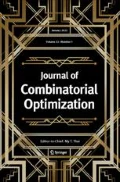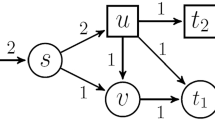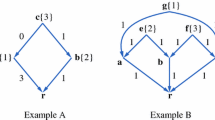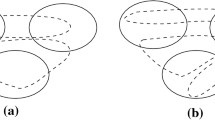Abstract
We study the algorithmic issues of finding the nucleolus of a flow game. The flow game is a cooperative game defined on a network D=(V,E;ω). The player set is E and the value of a coalition S⊆E is defined as the value of a maximum flow from source to sink in the subnetwork induced by S. We show that the nucleolus of the flow game defined on a simple network (ω(e)=1 for each e∈E) can be computed in polynomial time by a linear program duality approach, settling a twenty-three years old conjecture by Kalai and Zemel. In contrast, we prove that both the computation and the recognition of the nucleolus are \(\mathcal{NP}\) -hard for flow games with general capacity.
Similar content being viewed by others
References
Aumann RJ, Maschler M (1985) Game theoretic analysis of a bankruptcy problem from the Talmud. J Econ Theory 36:195–396
Brânzei R, Solymosi T, Tijs SH (2003) Strongly essential coalitions and the nucleolus of peer group games. CentER Discussion Paper 2003-19
Deng X, Papadimitriou CH (1994) On the complexity of cooperative solution concepts. Math Oper Res 19:257–266
Deng X, Ibaraki T, Nagamochi H (1999) Algorithmic aspects of the core of combinatorial optimization games. Math Oper Res 24:751–766
Deng X, Fang Q, Sun X (2006) Finding nucleolus of flow game. In: Proceedings of the 17th annual ACM-SIAM symposium on discrete algorithms (SODA 2006), pp 124–131
Edmonds J (1965) Paths trees, and flowers. Can J Math 17:449–467
Faigle U, Kern W (1995) Partition games and the core of hierarchically convex cost games. Universiteit Twente, faculteit der toegepaste wiskunde, Memorandum, No. 1269
Faigle U, Kern W, Kuipers J (1998) Computing the nucleolus of min-cost spanning tree games is \(\mathcal{NP}\) -hard. Int J Game Theory 27:443–450
Faigle U, Kern W, Kuipers J (2001) On the computation of the nucleolus of a cooperative game. Int J Game Theory 30:79–98
Fang Q, Zhu S, Cai M, Deng X (2002) On computational complexity of membership test in flow games and linear production games. Int J Game Theory 31:39–45
Garey MR, Johnson DS (1979) Computers and intractability: a guide to the theory of \(\mathcal{NP}\) -completeness. Freeman, San Francisco
Goemans MX, Skutella M (2004) Cooperative facility location games. J Algorithms 50:194–214
Granot D, Maschler M, Owen G, Zhu WR (1996) The kernel/nucleolus of a standard tree game. Int J Game Theory 25:219–244
Granot D, Granot F, Zhu WR (1998) Characterization sets for the nucleolus. Int J Game Theory 27:359–374
Grötschel M, Lovász L, Schrijver A (1993) Geometric algorithms and combinatorial optimization. Springer, Berlin
Huberman G (1980) The nucleolus and the essential coalitions. In: Analysis and optimizations of systems. Springer, Berlin, pp 416–422
Kalai E, Zemel E (1982a) Totally balanced games and games of flow. Math Oper Res 7:476–478
Kalai E, Zemel E (1982b) Generalized network problems yielding totally balanced games. Oper Res 30:498–1008
Kern W, Paulusma D (2003) Matching games: the least core and the nucleolus. Math Oper Res 28:294–308
Kopelowitz A (1967) Computation of the kernels of simple games and the nucleolus of n-person games. RM-31, Math Dept, The Hebre University of Jerusalem
Kuipers J, Solymosi T, Aarts H (2000) Computing the nucleolus of some combinatorially structured games. Math Program 88:541–563
Lemaire J (1984) An application of game theory: cost allocation. ASTIN Bull 14(1):61–81
Malkevitch J (2005) Resolving bankruptcy claims. Feature column, monthly essays on mathematical topics, AMS, March 2005. http://www.ams.org/featurecolumn/index.html
Megiddo N (1978) Computational complexity and the game theory approach to cost allocation for ta tree. Math Oper Res 3:189–196
Owen G (1975) On the core of linear production games. Math Program 9:358–370
Potters J, Reijinierse H, Biswas A (2006) The nucleolus of balanced simple flow networks. Games Econ Behav 54:205–225
Raghavan TES, Solymosi T (1998) An algorithm to locate the nucleolus prices for a real estate game. GPI XII
Schmeidler D (1969) The nucleolus of a characteristic function game. SIAM J Appl Math 17:1163–1170
Schrijver A (2003) Combinatorial optimization: polyhedra and efficiency. Springer, Berlin
Shapley LS, Shubik M (1972) The assignment game. Int J Game Theory 1:111–130
Solymosi T, Raghavan TES (1994) An algorithm for finding the nucleolus of assignment games. Int J Game Theory 23:119–143
Author information
Authors and Affiliations
Corresponding author
Additional information
Supported by NCET, NSFC (10771200), a CERG grant (CityU 1136/04E) of Hong Kong RGC, an SRG grant (7001838) of City University of Hong Kong.
Rights and permissions
About this article
Cite this article
Deng, X., Fang, Q. & Sun, X. Finding nucleolus of flow game. J Comb Optim 18, 64–86 (2009). https://doi.org/10.1007/s10878-008-9138-0
Published:
Issue Date:
DOI: https://doi.org/10.1007/s10878-008-9138-0




